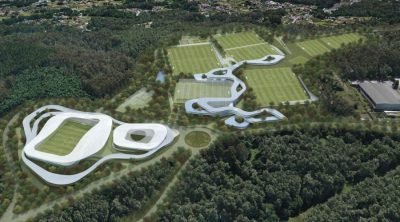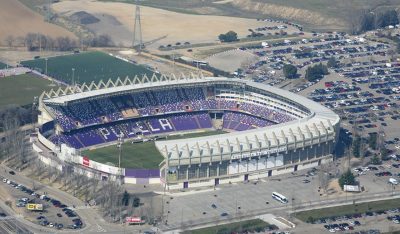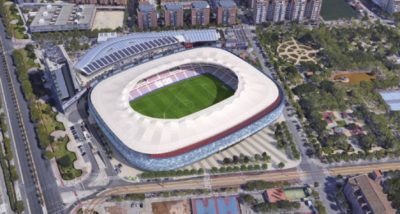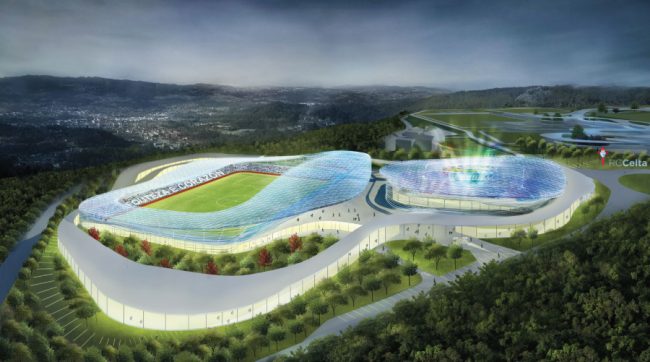Millions of euros are being put into new training centres and facilities as LaLiga sides show their commitment to long-term planning.
RC Celta, Real Valladolid and Levante are undertaking ambitious projects, but they’re not the only ones in Laliga.
Sometimes investing in facilities is as important for a football club as spending in the transfer market. Top-class training grounds can make workouts more efficient and enjoyable, create a positive environment around a club and even attract new players.
Further, as clubs expand their academies, establish new playing teams and strengthen ties to their local community, it’s becoming increasingly important to create central locations where all these activities can take place.
For all these reasons and more, clubs across Spain are investing in sports cities.
Whether by expanding their current facilities, building new structures from scratch, or both, there are numerous projects across the country that show the ambition and long-term thinking that currently exists among LaLiga clubs.
Three of these; RC Celta, Real Valladolid and Levante, shared what to expect in the months and years ahead.
RC Celta: “It will be a benchmark for Spanish and European football”
In Vigo, a brand-new sports city is being created in the Mos district with a stated objective of nurturing its academy while going beyond football. As a central location for the first team and academy team, the new site will house nine pitches, gym and spa areas, residences for young players and a mini-stadium for 4,000 spectators, along with a range of leisure and catering facilities.
“This is a vital and strategic project for the future of the club,” said Carlos Cao, Business Area Director at RC Celta.
“It is essential to have new facilities that are designed around our academy to build on the potential it has shown in recent years. Our growth model is based on our academy, helping us to expand internationally but with our own unique identity.”
To further develop this identity, the club plans to build classrooms for its sports university, which partners with the University of Vigo and establish a space for technological start-ups working on sports projects. It also plans to dedicate space to eSports, local fashion and gastronomy, nature activities and host music concerts.

“Stadiums are no longer a piece of concrete only 20-25 times a year,” continued Cao. “The evolution of the football industry forces us to change this model and update to the modern day. In our facilities our followers will be able to meet all their needs for leisure, fun and commerce.”
Environmental sustainability has also been a key factor in the clubs planning, with the management of water, land and energy all considered with the needs of future generations in mind.
“It will be a benchmark in Spanish and European football both for its unique construction and its ability to integrate in total harmony with surrounding nature,” concluded Cao.
Real Valladolid: “The new President is betting firmly on the academy”
The Real Valladolid project will see the club expand its facilities into two separate sites across the city. The existing sports city next to the club´s José Zorrilla Stadium is set to be modernised and expanded, increasing the number of pitches from three to ten and incorporating new club offices. A brand-new site, built over 30 hectares, will be dedicated exclusively to the club’s male and female academies.
David Espinar, Director of the President’s Office at Valladolid, said: “The main objective is to strengthen the academy and to provide the city, the province and the region with new facilities to play football. We’ll have modern facilities, as well as a public field that can be used by anyone who wants to play football. It is another way to involve the club in society and vice versa.”
Among the new features in the existing sports city, there will be a fan zone, a cafeteria, club offices and medical facilities. This is where the first team will train and there will also be a gym, a dressing room, a dining area, a press room, an auditorium, 30 bedrooms and leisure areas. The new location, in the Pinar de Jalón district, will have nine football pitches for the academy, as well as stands, offices and parking spaces.

This is all part of a project led by club President Ronaldo Nazário, who became the club’s leading shareholder in 2018.
Espinar added: “The new President is betting firmly on the academy as the best route to progress in a sporting, social and financial sense. The intention is to create a structure that can develop young players every year who are ready to join the first team.”
As Real Valladolid hopes to attract the top talent from the Castilla and León region before other professional teams, its cause will be boosted by offering some of the area’s best facilities.
Levante: “The leap in quality will be enormous”
Meanwhile in Valencia, Levante is embarking on a sports city project in the port area adjacent to the Nazaret neighbourhood of the city, a zone that is linked with the origins of the Laliga club and stands to benefit from such a significant new facility being built.
“It will be a clear example of how a sports facility is the engine of transformation of an area in a city,” said Communications Director Alberto Gil.
An area of 95,000 square metres has been located at the old Benimar Sports Club and the project has been designed with the aim of optimising the space in order to have as many football pitches as possible. Seven full-size pitches are due to be built, plus a mini stadium with a capacity of 2,500.
WATCH VIDEO: Completesports.com Live at Levante UD 2: Stadium Renovation
Using the site, the club intends to further develop its academy, increase on-site education and achieve better environmental practices such as energy and water conservation.
“The new sports city shows the strategy of the club to establish itself in the elite level of football over the next few years,” added Gil.
“The academy will be one of the great beneficiaries and the leap in quality that it will give will be enormous.”

The club plans a residence for 86 players and a three-storey building for the first team in the complex. This will lead onto the main training pitch and will also contain a gym, a dressing room, office space, leisure space, a dining area and much more. Facilities for the women’s team and for the youth teams will also be located at the site, with the club keen to offer the best for its players in a single location.
“If you compare this to the current sports city in Buñol we will gain a lot of competitiveness, since the distance to that site, 44 kilometres, has undoubtedly been a limiting factor,” added Gil. “For Levante, there will be a clear ‘before’ and ‘after’ when it comes to the new sports city.”
Other ongoing projects
While the projects of Celta, Valladolid and Levante are some of the most ambitious currently in progress, there are many more LaLiga clubs currently investing in infrastructure.
Top-flight sides like Eibar and Real Betis are building new sports cities, Athletic Club is making improvements to its existing facilities, while Atlético Madrid is adding another site to its academy.
LaLiga SmartBank clubs are also realising the importance of constructing facilities for their teams, with Andalusian club Málaga CF and Canary Island sides Las Palmas and Tenerife all currently working on sports cities as well.
Overall, millions of euros are being invested across Spain to secure a stable future for its clubs. The growth of LaLiga has boosted club revenues and helped teams move to a position where they can afford to invest.
This long-term thinking on behalf of the Laliga clubs can help cement their status as pillars of their local communities, while ensuring that the next generation of footballing talent continues to reach world-class standards.
This article originally appeared in Global Futbol, LaLiga’s fortnightly newsletter.





